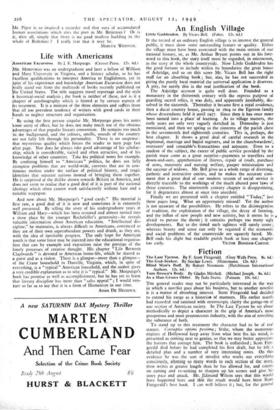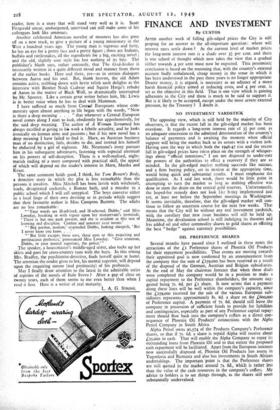Fiction
Blind Man's Bull. By Robert Neumann. (Hutchinson International Authors. I2s. 6d.) THE general reader may not be particularly interested in the way in which a novelist goes about his business, but to another novelist it is a matter of absorbing interest. Scott Fitzgerald had decided to extend his range as a historian of manners. His earlier novela had recorded and satirised with stereoscopic clarity the goings-on of one section of American society. In The Last Tycoon he set about methodically to depict a character in the grip of America's most prosperous and most preposterous industry, with the aim of revealing the substance of both.
To stand up to this treatment the character had to be of real stature. CotTuptio optimi pessima ; Stahr, whom the monstrous engines of Hollywood keep away from what best fits his mind, i. presented as coming near to genius, so that we may better appreciate the horrors that corrupt him. The book is unfinished ; Scott Fitz- gerald died before he had completed his first draft, but he left .a detailed plan and a number of very interesting notes. On this evidence he was the sort of novelist who works out everything consciously, allotting so many words to each section of the spry, then writes at greater length than he has allowed for, and coimts on cutting and re-writing to sharpen up his scenes and give hii story pace and attack. Mr. Edmund Wilson says that this would have happened here and thit the result would have been Scott Fitzgerald's best book. I can well believe it ; but, for the general
reader, here is a story that will stand very well as it is. Scott Fitzgerald uncut, unsharpened, unrevised can still make some of his colleagues look like amateurs.
Another celebrated American novelist of manners has also gone off on a new track, to give a picture of a young missionary in the West a hundred years ago. The young man is vigorous and lusty, he has an eye for a pretty face and a pretty figure ; there are Indians, buffalo and rattlesnakes, all the ingredients for a big, exciting novel ; and the old, slightly sour style has lost nothing of its bite. The publisher's blurb says, rather anxiously, that The God-Seeker is necessarily written in a quite different mood and manner from those of the earlier books. Here and there, yes—as in certain dialogues between Aaron and his soul. But, thank heaven, the old Adam remains active, stabbing down with fierce relish such delights as the interview with &other Noah Cudway and Squire Harge's rebuke of Aaron in the matter of Black Wolf, so dramatically interrupted by Mr. Speezer. Like a certain great writer before him, Mr. Lewis is in better voice when he has to deal with Mammon.
I have suffered so much from Centaal Europeans whose com- mentary upon almost anything in life began with the words, "Now is there a deep meaning . . . " that whenever a Central European novel comes along I start to look, obediently but apprehensively, for the said deep meaning. The author of A Woman Screamed has always excelled at giving to his work a febrile actuality, and he looks ironically on human aims and passions ; but if his new novel has a deep meaning I have failed to find it. Marx, an -Austrian business man of no distinction, fails, decides to die, and instead lets himself be abducted by a girl of eighteen. Mr. Neumann's irony pursues him in his subsequent adventures, fastening with especial attention on his powers of self-deception. There is a well-realised, night- marish ending td a story composed with practical skill, the appeal of which will depend on the reader's interest in Marx, Marika and Kraut.
The same comment holds good, I think, for Tom Brown's Body, a detective story in which the plot is less remarkable than the persons it involves. Miss Mitchell has been lavish with witchcraft, toads, decapitated cockerels, a Roman bath, and a murder in a public school which I will call untypical. The boys converse either in a local lingo of their own devising or in periods which suggest that their favourite author is Miss Compton Burnett. The adults are no less remarkable: "' Your words arc ill-advised, and ill-selected, Dobbs,' said Miss Loveday, breaking in with vigour upon her manservant's jeremiads. 'There is but one nark present, and she is resident at this scat of learning and discipline. Confine and annotate your nouns.'
" Beg pardon, madam,' responded Dobbs, looking sheepish, 'But I never knoo you knoo. . .
"'But little escapes these ears, these eyes or this enquiring and pertinacious proboscis,' pronounced Miss Lovcday. 'Give attention, Dobbs, to your mental superiors, the police.'"
The speaker, a housemaster's middle-aged sister, also tucks up her skirts and goes for cross-country runs with the boys. In this setting Mrs. Bradley, the psychiatrist-detective, finds herself quite at home. The attention the reader gives to her, his mental superior, will depend upon the enquiring nature (and pertinacity) of his proboscis.
May I finally draw attention to the latest in the admirable series of reprints of the novels of Italo Svevo ? After a gap of close on twenty years, each of them seems to me even better than when I read it first. Here is a writer of real maturity.
L. A. G. STRONG.































 Previous page
Previous page